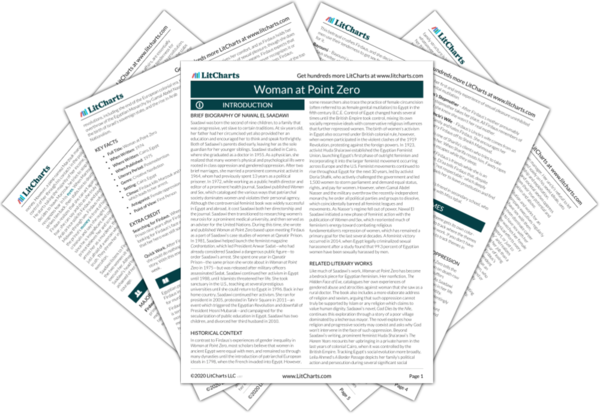In Egypt, religion plays a prominent role both in society and in government. Firdaus, an Egyptian woman on death row for killing a pimp, grows up surrounded by religious men who, in spite of their moralistic pretenses, frequently exploit and abuse her. Although such figures should theoretically be a source of protection and safety for women, they prove to be as manipulative and oppressive as anyone else, concerned primarily with their own self-interests. Firdaus’s depiction of religious figures in her life makes the case that in Egypt, religion is not a source of virtue or moral fortitude, but merely a tool to uphold the ruling class’s power.
Many of the men in Firdaus’s early life are deeply religious, yet act in reprehensible ways toward women, suggesting that religious involvement does not confer any actual virtue, justice, or moral character. Firdaus’s father goes to mosque every Friday to pray, and talks at length with his friends about the imam’s sermon and about virtue, asking, “Was it not verily true that stealing was a sin, and killing was a sin, and defaming the honor of a woman was a sin, and injustice was a sin, and beating another human being was a sin…?” However, Firdaus recalls that her father spends the rest of the week beating his wife, stealing his neighbor’s crops, and selling sick animals as if they are healthy. Her father is clearly hypocritical, suggesting that his religious convictions don’t actually produce moral character. Firdaus’s uncle, a respected religious scholar, sexually abuses her as a child, which indicates that the religious leaders are as hypocritical as their followers. Moreover, when Firdaus’s husband Sheikh Mahmoud beats her until she is bruised and bloody, she runs to her uncle for protection, assuming that as a religious figure, he will protect her. However, Firdaus’s uncle claims that all men beat their wives, and his wife tells Firdaus that “it was precisely men well versed in their religion who beat their wives. The precepts of religion permitted such punishment.” Rather than protecting women, Firdaus’s experience suggests that religious leaders encourage women’s oppression, seemingly justified by their religious “precepts.”
Firdaus observes that rather than serving God, religious leaders and rulers seem more interested in defending their own wealth and power, suggesting that religion is only a tool to protect the ruling class. Firdaus notes that men like her father believe “that love of the ruler and love of Allah [God] were one and indivisible,” which implies that organized religion is inherently nationalistic, wedded to the state and its power. When Firdaus is in secondary school, she often sees pictures in newspapers of “one or other of these rulers” praying at the mosque, surrounded by his entourage. The ruler always wears “an expression of great humility, like a man stricken to his depths,” but Firdaus knows that “he was trying to deceive Allah in the same way as he deceived his people” by solemnly praying and chanting. The rulers’ showmanship suggests that their religion is simply a façade, a tool to make them look noble and innocent. Such rulers and religious leaders often pray for “the souls of the nation’s martyrs” who died in war. However, watching them, Firdaus posits, “When they pronounced the word ‘patriotism’ I could tell [they] feared not Allah, and that at the back of their minds patriotism meant the poor should die to defend the land of the rich, their land, for I knew the poor had no land.” Firdaus’s statement pointedly argues that religion is not a way to serve God, but merely a system for the ruling class to enforce their rule and protect their money by manipulating those below them. Overall, Firdaus takes a cynical view of religion in Egypt, arguing that it is merely a façade that the ruling class uses to reinforce their own power and wealth—and that those who profess to be religious tend to be at least as immoral as anyone else.
Religious Hypocrisy ThemeTracker

Religious Hypocrisy Quotes in Woman at Point Zero
That love of the ruler and love of Allah were and one indivisible. Allah protect our ruler for many long years and may he remain a source of inspiration and strength to our country, the Arab Nation and all Mankind.

Unlock explanations and citation info for this and every other Woman at Point Zero quote.
Plus so much more...
Get LitCharts A+“Firdaus has grown, your holiness, and must be married. It is risky for her to continue without a husband. She is a good girl, but the world is full of bastards.”
She replied that it was precisely men well versed in their religion who beat their wives. The precepts of religion permitted such punishment. A virtuous woman was not supposed to complain about her husband. Her duty was perfect obedience.
I knew that my profession had been invented by men, and that men were in control of both our worlds, the one on earth, and the one in heaven. That men force women to sell their bodies at a price, and that the lowest paid body is that of a wife. All women are prostitutes of one kind or another. Because I was intelligent, I preferred to be a free prostitute, rather than an enslaved wife.
One day, when I donated some money to a charitable association, the newspapers published pictures of me and sang my praises as the model of a citizen with a sense of civic responsibility. And from then on, whenever I needed a dose of honor and fame, I had only to draw some money from the bank.











